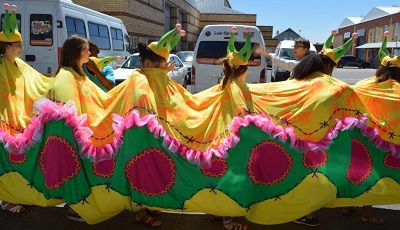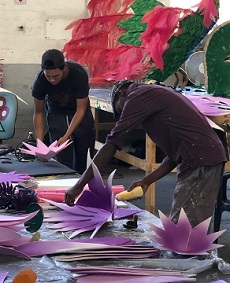The Cape Town Carnival, a Social
Impact initiative under the leadership of Stellenbosch University’s Professor
Rachel Jafta, is a spectacular experience of colour, creativity and diversity
for spectators who flock to the famous Green Point Fan Walk year after year.
The team behind it all has been working tirelessly for close to a year to bring
the 2018 edition of this beloved annual event to life.
Featuring close to 1 700 dancing,
singing and instrument playing performers and magnificently designed and
fantastically intricate floats, all around the theme Mother City, Mother
Nature, the 2018 Carnival will kick off at 19h00 on Saturday 17 March.
 Stellenbosch University’s involvement
with the Carnival this year includes a new feature: Cape Town Carnival
2018 will see the participation of 20 American International Scholars; a
program of Stellenbosch University. American Institute For Foreign Study (AIFS)
seeks to facilitate uplifting South African experiences for foreign students
and they are twinning with Believe in Schatzi (BiSO) by providing food for the
BISO participants for rehearsals and event day. BiSO is an NPO that assists
young adults and children living with disabilities to develop greater
independence, social confidence, and the skills required to lead self-driven
lives. Both organisations are participating in the Cape Town Carnival for the
first time this year and their collaboration as the ‘Caterpillars’ (AIFS) and
‘Insect Orchestra’ (BiSO) is also a great example of the Cape Town Carnival’s
efforts to promote social inclusion/social cohesion.
Stellenbosch University’s involvement
with the Carnival this year includes a new feature: Cape Town Carnival
2018 will see the participation of 20 American International Scholars; a
program of Stellenbosch University. American Institute For Foreign Study (AIFS)
seeks to facilitate uplifting South African experiences for foreign students
and they are twinning with Believe in Schatzi (BiSO) by providing food for the
BISO participants for rehearsals and event day. BiSO is an NPO that assists
young adults and children living with disabilities to develop greater
independence, social confidence, and the skills required to lead self-driven
lives. Both organisations are participating in the Cape Town Carnival for the
first time this year and their collaboration as the ‘Caterpillars’ (AIFS) and
‘Insect Orchestra’ (BiSO) is also a great example of the Cape Town Carnival’s
efforts to promote social inclusion/social cohesion.
Power for positive change
 “The
Cape Town Carnival reaches more than 5000 community members in the broader Cape
Town Metropolitan area and some rural areas, as well as about
55000 spectators annually. It contributes about R41 million to the local
economy, creates jobs and enterprise development, and skills transfer
opportunities,” says Prof Rachel Jafta who is based in the Department of Economics
at Stellenbosch University and Chair and founding trustee of the Cape Town
Carnival. “The University is a knowledge
partner sharing its expertise with participating communities. The Carnival also
offers opportunities to gain research data and conceptualise research questions
that can lead to collaborative solutions with the participating communities,”
she says.
“The
Cape Town Carnival reaches more than 5000 community members in the broader Cape
Town Metropolitan area and some rural areas, as well as about
55000 spectators annually. It contributes about R41 million to the local
economy, creates jobs and enterprise development, and skills transfer
opportunities,” says Prof Rachel Jafta who is based in the Department of Economics
at Stellenbosch University and Chair and founding trustee of the Cape Town
Carnival. “The University is a knowledge
partner sharing its expertise with participating communities. The Carnival also
offers opportunities to gain research data and conceptualise research questions
that can lead to collaborative solutions with the participating communities,”
she says.
“One of our main aims is to foster
social cohesion through the Cape Town Carnival. Independent research indicates
we are having significant impact in this regard, bringing participating
communities and the public together in a safe and celebratory space every
year," says Jay Douwes, CEO of the Cape Town Carnival. “Participants and
spectators are united in love of the Mother City and pride in South African
diversity."
Another major benefit of the Cape
Town Carnival is the skills development that takes place among the participants
and production crews. Since many of the job opportunities created by the Cape
Town Carnival are seasonal and/or contract work, many employees go on to work
in other industries, using skills developed while building floats or sewing
costumes for the Cape Town Carnival.
The environmentally conscious Cape
Town Carnival
Sustainability and environmental
awareness are two core principles of the Carnival and its organisers. “The
water crisis gripping the Western Cape has given us the opportunity to further
our responsible business practices," says Douwes. These include measures
like installing rainwater-harvesting tanks at the main production workshop in
Maitland, enforcing a policy of zero-waste-to-landfill and bringing down
individual water usage for flushing and cleaning to less than four litres per
person per day.
“Major events like the Cape Town
Carnival create all kinds of benefits for the city, from increased tourism to
job creation," says Alderman JP Smith, Cape Town mayoral executive
committee member for Safety, Security and Social Services. “It is, of course,
especially heartening that the organisers decided to eliminate the event's
dependence on our city's limited resources such as water."
Better and better every year
The first Cape Town Carnival was
hosted in Long Street in 2010 and drew around 11 000 spectators. Last year,
about 45 000 people watched the show, and organisers invite more people to join
the celebration every year.
“Each year we as performers and
artists are amazed by the overwhelmingly positive response from the
public," says Brad Baard, Creative Director for the Carnival. “That's what
motivates us to keep coming back, to put love and inspiration in the streets,
doing it all brighter and better the next year."
Now in its ninth year, the Cape Town
Carnival has proven an economic boon for the city as well. Independent analysis
conducted by the South African Culture Observatory, a creative economy think
tank and the research arm of the National Department of Arts & Culture
calculated direct contributions to the city's GDP from the 2017 event alone at
R41 million.
“Cape Town is a diverse, creative,
colourful, talented and certainly a successful city, and we're proud to play a
part in this amazing city's Carnival," says John van Rooyen, Operations
Director for the Cape Region at Tsogo Sun, the 2018 event's official hotel
partner.

American Institute For Foreign Study (AIFS) Participants

Believe in Schatzi (BiSO) Participants

